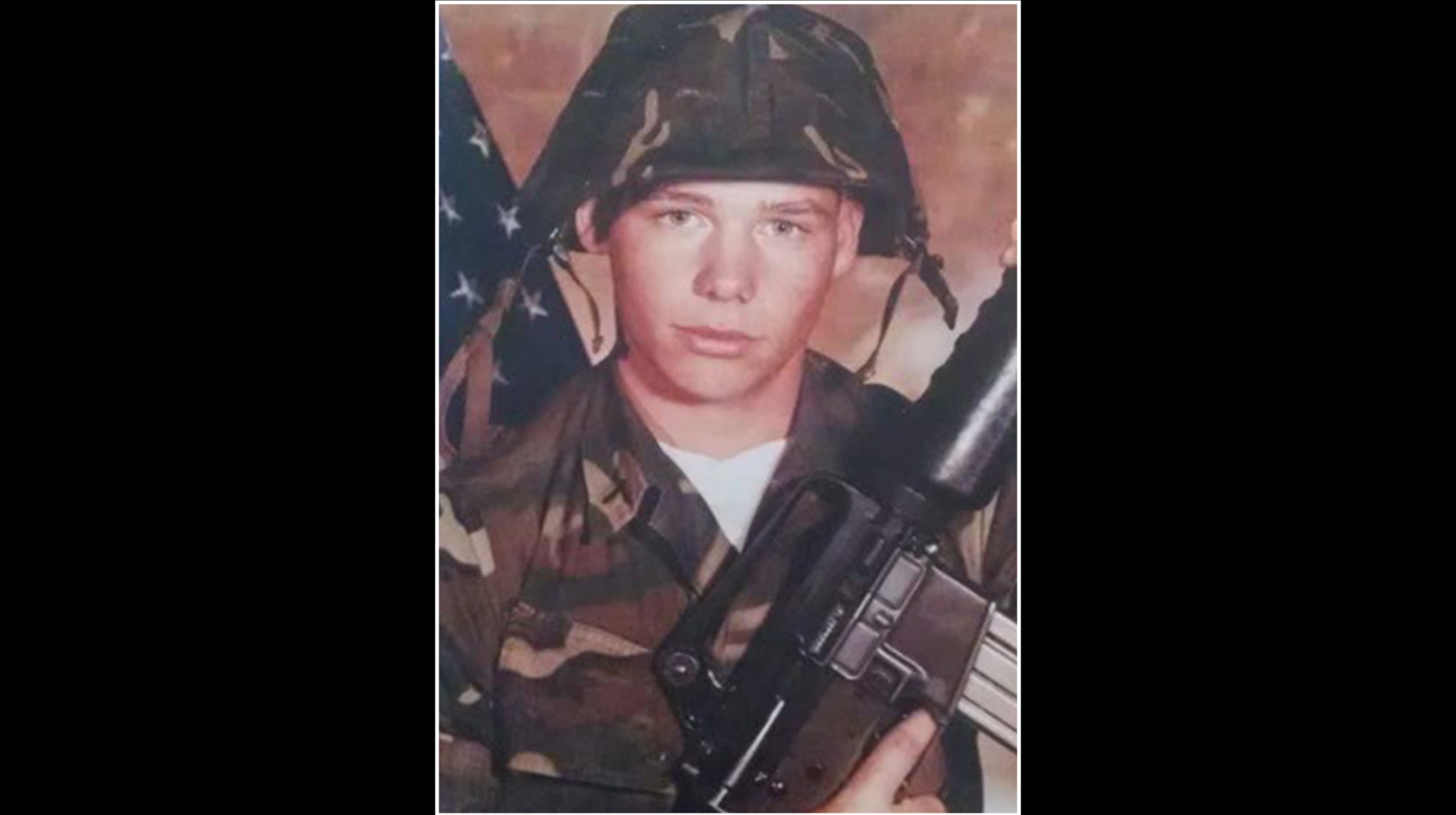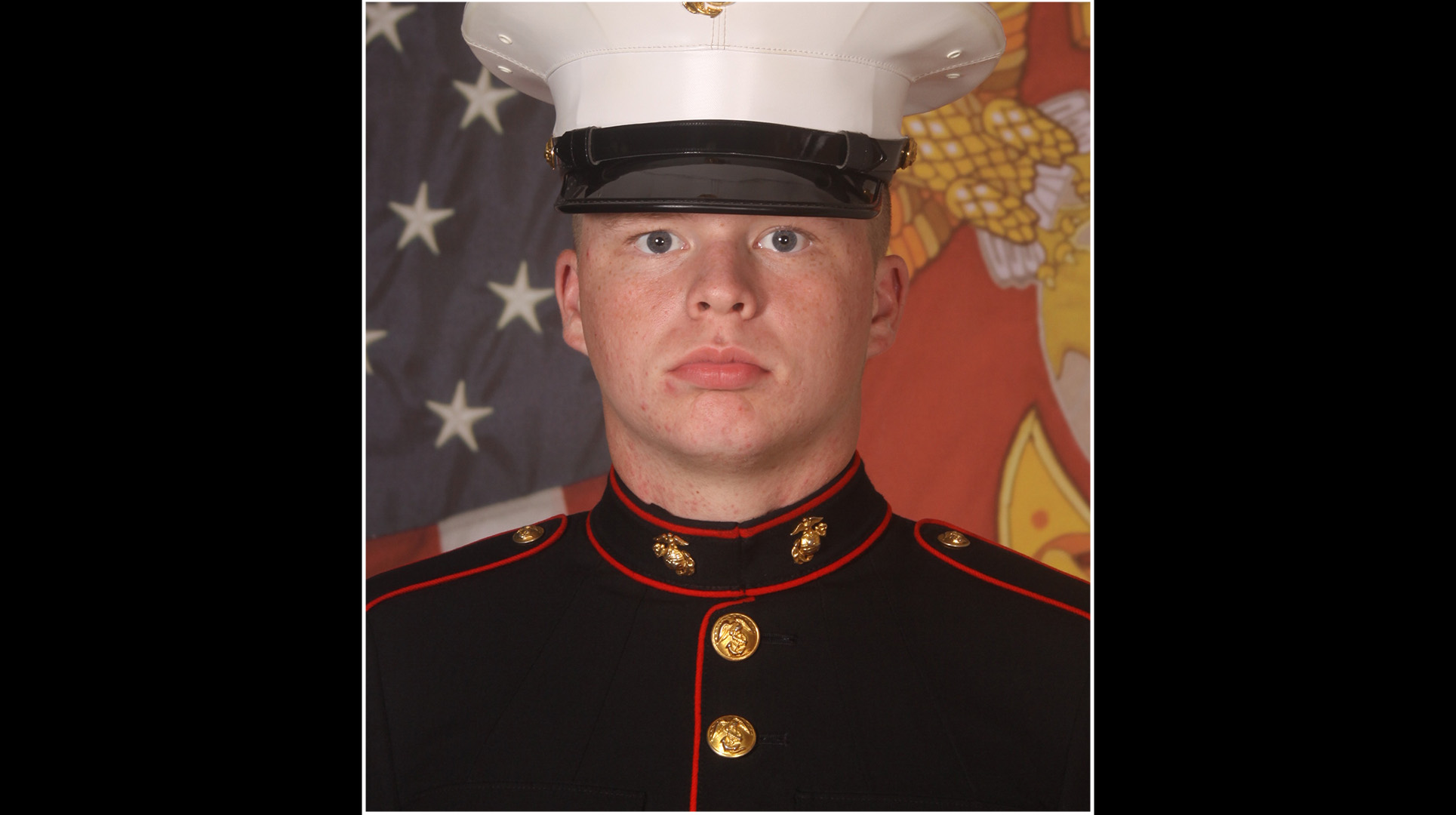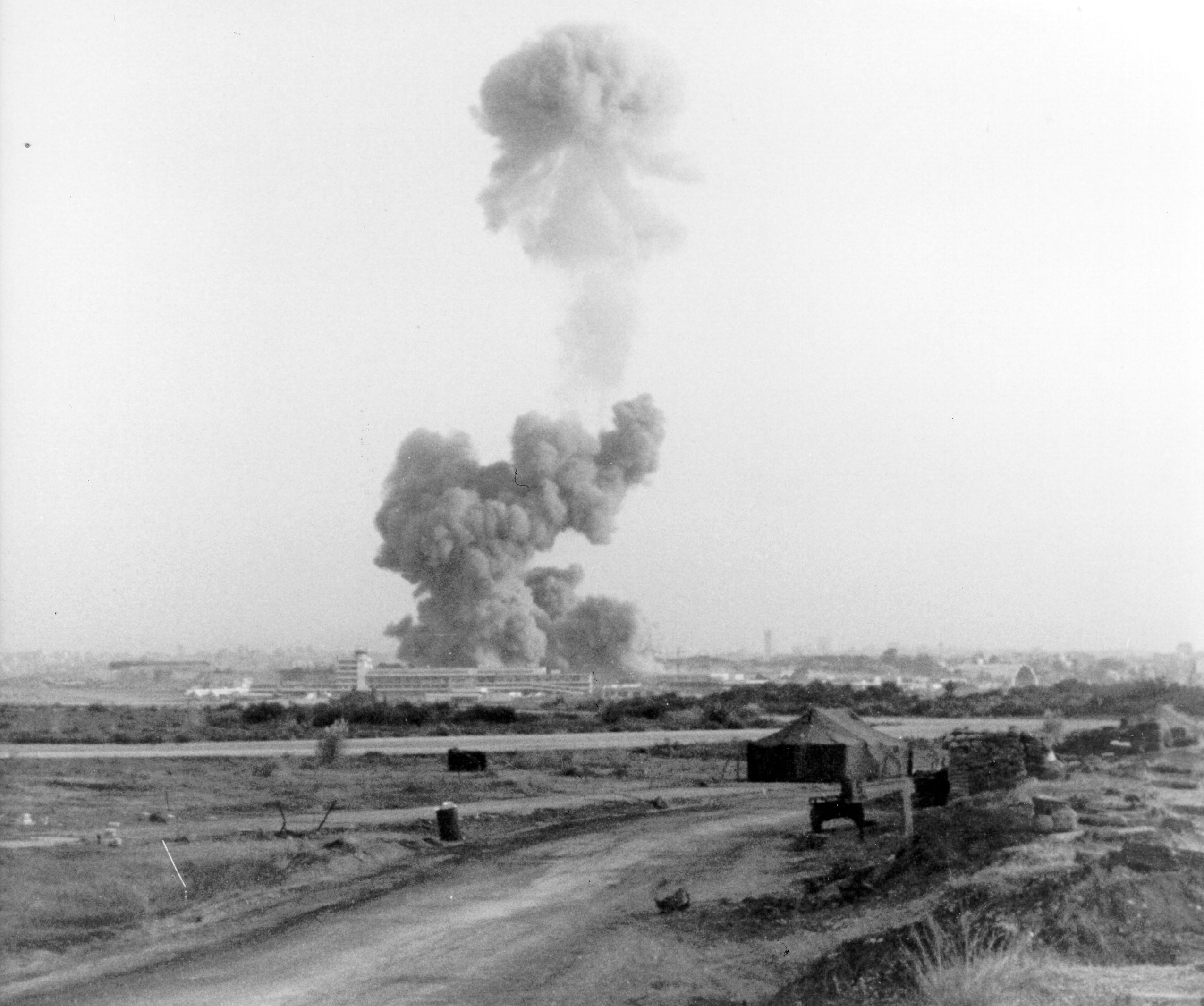His grandfather was a ‘Beirut Marine.’ Now he’s graduating from Parris Island.
Marine Pvt. William Smith‘s grandfather died in the 1983 Beirut bombing. Mentored by other 'Beirut Marines' as he grew up, Smith will graduate from Parris Island Friday.

Marine Sgt. William H. Pollard, 24, was one of 220 Marines killed in the Oct. 23, 1983 bombing attack on a Marine barracks in Beirut, Lebanon, the Marine Corps’ deadliest day since the battle of Iwo Jima. This week, nearly 41 years later, Pollard’s grandson, Pvt. William Smith, is set to graduate Friday from Marine Recruit Depot Parris Island, South Carolina.
“Doing this, especially walking across that parade deck, it feels that I’m following in his footsteps and doing justice by my family name,” Smith, 17, told Task & Purpose this week
Though Smith never met Pollard, his grandfather’s legacy has always been an important part of his family’s life. He has grown up with other Beirut Marines as close family friends. Word that Smith had decided to enlist brought a recent Marine ball to a standing ovation, and two veterans who survived the attack came to Parris Island last week to put his Eagle, Globe, and Anchor in his hand.
At the ceremony, Smith thought about his grandmother, who died two years ago.
“My first thought was: She’d be so proud,” Smith said. “If she would have been able to make it here, she would have told me that my grandfather was proud of me.”

On Friday, Smith will graduate from recruit training. When boot camp got tough, he said, thinking about his grandfather’s legacy helped carry him through. Smith initially wanted to become a Marine Security Guard — the hand-picked Marines who guard U.S. embassies around the world — but ultimately decided to join the infantry.
Smith said his mother was nervous about his decision to become an infantry Marine, given the current instability in the Middle East and the rest of the world. But he felt it is more important than ever for him to stand up for his family and what they believe in.
“People should pay more attention to history,” Smith said, “Because the way the world was then is similar to how it is now, and if people don’t pay attention, something like that could happen again.”
Finding a purpose in the Marines
Smith said his family often attended an annual memorial service for the U.S. troops killed in Beirut, meeting Marines who survived the bombing. Hearing their stories set his path towards enlisting
“It definitely played a role in me joining the Marine Corps – seeing them all come together for those couple of days that they were in town for the memorial service, and just seeing how even years after retiring, all of those Marines are still close together and still have that bond,” Smith said. “It’s just something I wanted to be a part of.”
Before he enlisted, Smith consulted one veteran who had served with the Marines in Beirut and now owns a boxing gym. Smith asked the man if he had made the right decision to join the Marine Corps.
“He told me yes,” Smith said. “He said it helped him get his life together and figure out how to go about opening the gym and accomplishing his dreams and any other goals he had in his personal life. And I thought: That sounded like something I wanted. Because I wanted a sense of purpose of direction, and he said that’s what it gave him. So, I decided: That’s what it’s going to be for me.”
Now, Smith, said he hopes to eventually join 1st Battalion, 8th Marines, just like his grandfather.
Subscribe to Task & Purpose today. Get the latest military news and culture in your inbox daily.
“It would be important to me because it would mean that all those Marines who served and all those who died like my grandfather, it would make me feel like I’m doing justice to them and continuing on their legacy,” Smith said.
In fact, the commander of 1/8 Marines announced at its Marine Corps Birthday Ball last year that Smith intended to enlist, he received a standing ovation from those in attendance, including Beirut veterans and other Gold Star families.

“All the Marines around me applauded me and it just felt really good to know that there was a chance I was going to make it there with them one day,” Smith said.
Stacey Pollard was only 4 years old when she lost her father – Smith’s grandfather – in the Beirut bombing. Although she does not have many memories of him, she knows that he always wanted to be a Marine.
“He was told by his parents that he would never make it and he was worthless,” she told Task & Purpose. “And, all he wanted to do was make the Marine Corps proud and be a Marine forever.”
Pollard said she was proud when her son told her that he wanted to join the Marines as well, but she was also scared.Ultimately, Pollard believes in the teaching of her Catholic faith that “what’s going to be is going to be no matter what you do,” she said.
“I’m very proud of him and I wish him all the success in the world, and I know he’ll make a great Marine,” Pollard said.
‘Wear it well’
John Weant and Dan Kovach never met WilliamPollard when all three were 1/8 Marines in Beirut. For both of them, the peacekeeping mission was full of combat
Yet much of what the Marines went through in Lebanon has been forgotten, said Weant. He recalled sitting in the officer’s club at Parris Island recently and hearing a colonel claim that Marines in Beirut didn’t have live rounds in their weapons at the time.
“I looked and I said: With all due respect, sir, that’s bulls—t,” Weant said.

Weant’s company was involved in a lot of fighting. On Aug. 29, 1983, he and eight other Marines were wounded by mortar and rocket fire. His platoon sergeant and platoon commander were both killed.
“I was the only alive that was medevaced that day,” Weant said. “I was medevaced out with two caskets with those two bodies.”
Despite the constant combat during the mission, Weant believes the heroism that Marines showed in Lebanon has been overlooked.
“Lebanon was an opportunity for a lot of Marines to show immense valor, which they did, and they were not recognized,” Weant said. “It was a bad situation for Marines to be in, but we were peacekeepers. That was our mission. Until they started attacking us, we weren’t allowed to go on the offensive. However, when we got attacked, we hit back. And I want people to know that.”
Roughly a week before the bombing, Kovach’s unit was in a firefight in which a captain was killed. The fighting was so intense that it took three days to recover the fallen Marine.
On Oct. 23, 1983, Kovach was stationed at the bombed out remnants of the American University in Beirut, which was about a mile away from the ad hoc headquarters for the 1st Battalion, 8th Marines. Just before 6:30 a.m. that morning, a suicide bomber drove a truck with 12,000 pounds of explosives onto headquarters building and detonated.. FBI investigators would later describe the bomb as the largest non-nuclear blast they had ever seen.
As word spread that the battalion headquarters had been attacked, Kovach went over to talk to a fellow Marine whose brother was in the headquarters building.
“I saw him sitting in the dark in the top of the steps, so I climbed the steps and went up there,” Kovach said. “I sat down next to him. He just turned to be, and he looked, and he said, ‘Danny,’ he said, ‘My brother’s dead.’ And I said: How do you know that? And he said, ‘I just know.”
The Marine would eventually learn he was correct.
When Kovach and other Marines went to the site of the bombing on Nov. 8, 1983, the stench was overpowering.
“It was just these piles of rubble, and of course you knew that it was just full of human flesh,” Kovach recalled. “It was so vile, you couldn’t breathe.”
The eventual death toll was 220 Marines, 18 sailors, and three soldiers.
As the years passed, Beirut veterans have remained a tight knit group, with regular reunions. Smith’s family would frequently attend, Kovach told Task & Purpose. In the early years, it was Pollard’s wife, who would bring the fallen Marine’s young children. She would often ask questions about what the Marines in Beirut had gone through.
Kovach explained that Marines go to war to defend the United States and the Constitution, but during combat they are focused on helping the Marine in the foxhole next to them, and that commitment extends to their families.
Decades later, the once-small Gold Star children came to the reunions with their own kids, including Smith.
“We’ve watched him grow up,” Weant said. “He’s been around all the Beirut veterans all of his life. He’s been around all these Marines that served with his grandfather. And he’s a very respectful young man. He’s always been a really good kid who’s always been good to his mom, good to his grandmother. And, it was just a huge sense of pride for me to realize that this kid was going to be a Marine.”
At Smith’s going away party, Weant told him to be himself, surround himself with good people, and stay away from “s—tbirds,” cautioning that those people would drag him down.
On May 17, both Kovach and Weant were given the opportunity to give Smith his Eagle, Globe, and Anchor after Smith finished The Crucible – the grueling 54-hour capstone training event of boot camp.
For Weant, being able to watch Smith grow from a kid to a Marine was something he could not pass up. He also knew that Smith’s grandfather would have wanted him to be there.
When Smith saw Kovach and Weant on the parade deck, “The biggest smile in the world came over his face.” Kovach recalled.
“When it started to become his turn, we walked down there, and they handed us his Eagle, Globe, and Anchor, and we put it in his hand, and gave him a hug and told him that we loved him and that he did a good job,” Kovach said. “And then when that was done, I just grabbed him and I said: Wear it well.”
The latest on Task & Purpose
- Married Marines graduate from Parris Island boot camp together
- USS Carney had ‘seconds’ to respond to anti-ship ballistic missiles
- 18th Airborne Corps orders soldiers on staff duty to get some sleep
- Bud Anderson, the last World War II ‘triple ace,’ dies at 102
- Air Force general will jump from one to three stars to lead air commandos
